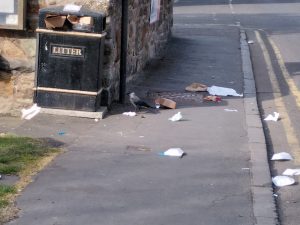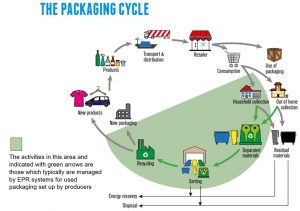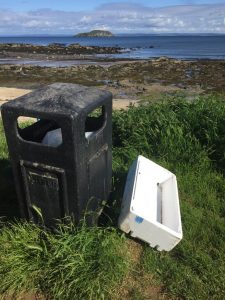Extended Producer Responsibility, or EPR, is seen as a valuable tool in the box of solutions to packaging pollution, but what is it exactly?
Packaging is an integral part of our daily lives, and sadly also of marine and terrestrial litter. Making manufacturers responsible for the costs of dealing with their packaging after use, called ‘Extended Producer Responsibility’, or EPR, is seen as one of several tools against pollution. There is a growing awareness of what we as consumers can do, from choosing to reuse, to opting for recyclable packaging wherever possible, but what are our governments and industries doing?

Figure 1. Fast food and other packaging litter © Fidra
Developing a ‘circular economy’
EPR is a form of environmental policy which gives producers responsibility for the impacts their products will have at the end of their life[i]. The theory is that by making producers responsible (rather than consumers) this feeds back into the supply chain and creates a circular approach to a product’s life. Such an approach, or ‘circular economy’, could have a significant impact towards preventing packaging pollution, leading to reduced unnecessary packaging, increased innovation, and recirculating the packaging we do use.
Where we can’t recirculate packaging or eliminate using it altogether, we need to keep it in the economy by making sure it’s collected, sorted and composted or recycled after use. Improving and scaling these processes is one of the key challenges for achieving a circular economy for packaging. At the moment many such processes are still very niche and economically unattractive. In most cases the costs of collection, sorting and composting or recycling are greater than the income from those composted or recycled materials. We therefore need a way to fund those costs, and in a way that can be sustained long-term. While public funding does have a role to play, it is not enough on its own, and any voluntary funding is unlikely to be sufficient or ongoing.
Mandatory EPR schemes
A proven way to provide the necessary funding is through schemes where the companies putting packaging on the market are required to pay for its collection, sorting, and recycling — such schemes are called extended producer responsibility (EPR).
Mandatory EPR could provide the answer. EPR means whoever introduces packaging into a country’s market remains responsible for that packaging after its use. This creates a level playing field for everyone involved.
The most common approach is:
- Company puts packaging on the market;
- A Producer Responsibility Organisation (PRO) collects fees from the companies putting packaging on the market;
- Fees go towards activities related to collection, sorting and composting or recycling of packaging to achieve set targets and objectives.
The design of EPR schemes provides sustainable long-term funding by ensuring funds are dedicated, sustainable and sufficient. That is, they are ringfenced and dedicated to collection, sorting and composting/recycling of packaging, mandatory and therefore guaranteed, and fees are tied to the actual costs of recycling processes.

Figure 3. The packaging cycle © EUROPEN (taken from https://www.europen-packaging.eu/wp-content/uploads/2021/04/EUROPEN-factsheet-on-EPR-for-used-packaging.pdf)
Incentivising innovation
There are numerous mandatory EPR schemes already, with many under consideration or in development. Existing schemes have shown it can reduce waste disposal, increase collection and recycling rates, and provide markets for recycled material[ii] [iii].
As well as being a guaranteed funding mechanism, EPR can incentivise upstream solutions, such as reusable or more easily recyclable packaging. It can also lead to the development of more efficient systems, the reduction of carbon emissions, and increased transparency of financial and material flows. In particular it can increase awareness of good packaging design and collection systems.
The increasing importance and acceptance of EPR is clearly shown by the Ellen MacArthur Foundation’s EPR statement released on 15th June 2021[iv]. Highlighting the role of EPR as a ‘key enabler of circular economy’ the statement includes an agreement signed by 150 organisations.
The UK’s position on EPR and other schemes
The UK Government and Devolved Administrations of Scotland, Wales and Northern Ireland all intend to introduce EPR for packaging. A consultation in 2019 was used to draw up recommendations for a scheme, which were consulted on in turn earlier this year[v].The main aspects of the consultation were:
- Starting implementation of EPR in 2023;
- Setting minimum recycling targets for 6 categories of packaging materials:
- Paper/card
- Glass
- Aluminium
- Steel
- Plastic
- Wood;
- Whether to consider ‘closed loop’ recycling targets to increase the use of reusable/refillable packaging;
- What costs the EPR would cover, i.e. collecting, sorting and recycling from households and businesses, and litter and refuse management costs for bin and ground litter;
- Who is responsible for the cost of managing a piece of packaging, i.e. at which point(s) to apply the charge;
- Disposable cups;
- Modulated fees that reflect criteria such as recyclability, i.e. producers whose packaging contributes positively to scheme outcomes (e.g. easily recyclable) will pay lower fee rates, while fee rates for packaging which does not contribute positively to scheme outcomes will be increased (e.g. unrecyclable);
- Introduction of mandatory recyclability labelling;
- Plastic film and flexible packaging;
- Bio-degradable, bio-based and compostable plastic packaging;
- Payment for management of packaging waste from households and businesses, and packaging disposed of in the litter stream;
- Scheme administration and governance, reprocessors and exports, monitoring and enforcement, digital design.
Additional schemes to mitigate littering and increase recycling are being introduced or considered, such as Deposit Return Schemes (DRS) and a Plastic Packaging Tax on packaging with less than 30% recycled content[vi] [vii]. The recent UK Government consultation on EPR was run alongside ones on DRS and consistency in recyclable waste collection across local authorities, another aspect that impacts levels of collection and recycling[viii].
These schemes provide some essential steps towards reducing littering and pollution, and in combination have the potential to significantly reduce our (over)use of resources. It is now important that schemes are developed and implemented rapidly, and with transparency to ensure impacts are monitored and schemes are not used as greenwashing by big brands and retailers.

Figure 3. Polystyrene fish box in coastal litter © Fidra
[i] https://www.expra.eu/uploads/downloads/EXPRA%20EPR%20Paper_March_2016.pdf
[ii] Rubio, S. et al (2019) Effectiveness of extended producer responsibility policies implementation: The case of Portuguese and Spanish packaging waste systems. Journal of Cleaner Production, 210, 217-230. https://doi.org/10.1016/j.jclepro.2018.10.299
[iii] Winternitz, K. et al (2019) Extended producer responsibility for waste tyres in the EU: Lessons learnt from three case studies – Belgium, Italy and the Netherlands. Waste Management, 89, 386-396. https://doi.org/10.1016/j.wasman.2019.04.023
[iv] Ellen MacArthur Foundation (2021) Extended Producer Responsibility EPR statement and position paper | Shared by New Plastics Economy (thirdlight.com)
[v] https://consult.defra.gov.uk/extended-producer-responsibility/extended-producer-responsibility-for-packaging/supporting_documents/23.03.21%20EPR%20Consultation.pdf
[vi] https://www.gov.scot/policies/managing-waste/deposit-return-scheme/
[vii] https://www.gov.uk/government/publications/introduction-of-plastic-packaging-tax-from-april-2022/introduction-of-plastic-packaging-tax-2021
[viii] https://consult.defra.gov.uk/waste-and-recycling/consistency-in-household-and-business-recycling/
Tags: circular economy, EPR, Extended Producer Responsibility, litter, packaging, pollution
